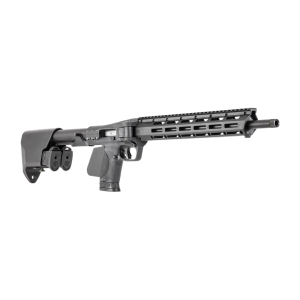
Caravani.GE
Smith & Weston M&P FPC CA COMPLIANT
Successful countries are founded on democratic principles such as the right to life, personal freedom, and human dignity. Throughout history, people have fought and even died for these ideals. Wars have been waged, and new states have been formed in the name of freedom. The idea of personal liberty goes back to ancient times—when early humans lived in tribal communities, hunted freely, used weapons for self-defense, and learned the value of self-preservation.
In the 21st century, the concept of freedom has taken on a more complex and nuanced meaning. Technological advancements—driven in part by the military-industrial sector, digital media, and artificial intelligence—have created both unprecedented threats to freedom and powerful tools for defending it. The same technologies that can violate privacy and autonomy can also be harnessed to protect those very rights.
When discussing protection and freedom, the first association for many is weapons. By "weapons," I mean firearms, cold weapons, and other personal defense tools capable of deterring or neutralizing threats. In many post-Soviet and now even Western countries, weapons are often portrayed as inherently dangerous—tools that promote crime and violence. However, this view neglects a crucial reality: weapons in the hands of responsible, law-abiding citizens serve as a powerful safeguard for individual and national security.
A simple truth must be acknowledged: a citizen who has passed medical and psychological screenings, who may be a former law enforcement officer, and who has led a law-abiding life should have the right—and perhaps the duty—to own firearms. Such individuals can protect themselves, their families, and their country from crime, violence, and external threats.
Naturally, being armed and equipped requires financial resources, which ties the concept of national defense directly to economic stability. Switzerland is a prime example. This small Alpine country, known for its economic strength and neutrality, has long embraced the concept of a well-armed civilian population. Its citizens are trained, equipped, and prepared to defend their nation from any aggressor. This widespread readiness has served as a strong deterrent—and helped establish Switzerland as a prosperous, independent, and resilient nation. Swiss citizens, inspired by the principles of freedom and responsibility, have created a model of strength built not on aggression, but on preparation and discipline.
Looking at the present day, we can observe a similar cultural sentiment emerging in Georgia. Online military stores and YouTube channels promoting responsible gun ownership and self-defense are becoming increasingly common. This suggests a deep-rooted cultural value: the love of freedom and the duty to protect it. It is embedded in the Georgian mentality and national character. To protect freedom is to be prepared. Armed readiness is not about seeking conflict but about deterring it. By preparing for the worst, we hope for the best. Our objective should be to foster a community of armed, law-abiding citizens who contribute to the strength and resilience of the state.